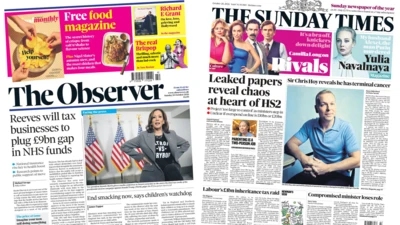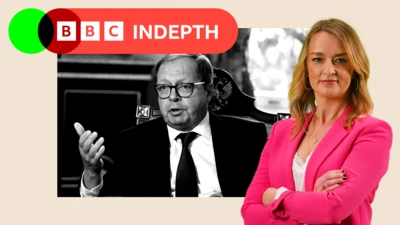We've updated our Privacy and Cookies Policy
We've made some important changes to our Privacy and Cookies Policy and we want you to know what this means for you and your data.
When is an NDA not an NDA?
Image source, Getty Images
- Author, Chris Cook
- Role, Policy editor, Newsnight
The House of Commons authorities' response to our latest reporting on bullying and harassment in the Palace of Westminster is rather confusing. In short, they have decided to create new definitions of words - specifically, the term "non-disclosure agreement" - and then accuse us of using the phrase incorrectly.
The issue is this: we have reported that Angus Sinclair, a former private secretary to the Speaker of the House of Commons, was paid Β£86,250 as part of a deal that involved signing a non-disclosure agreement. He had worked from 2005 to 2009 for Michael Martin, and from 2009 to 2010 for John Bercow.
He was bound to "refrain from instituting any complaint against the Employer" and "to make no public statement or comment relating to the Employee's service with the House of Commons".
David Natzler, clerk of the House, summarised the note publicly yesterday as stating that "both sides agree to make no public statement or comment relating to the employee's service or his departure from such service, except in the terms of a statement agreed by both parties".
Mr Sinclair's view - and that of other people involved in the negotiation - was that this was intended to keep Mr Bercow's behaviour towards him a secret. Mr Sinclair says he was bullied, and Mr Bercow absolutely denies it.
Pay-offs and secrets
Is it an NDA? Well, "non-disclosure agreement" is a woolly term. It does not have a precise legal form. But according to the House of Commons's own select committee on equalities, a non-disclosure agreement is defined very simply:
"Non-disclosure agreement' is increasingly used as a catch-all term for agreements that include confidentiality clauses - sometimes referred to as gagging clause... They are also commonly used in agreements that are reached between employers and employees when employment is terminated (known as settlement agreements)."
That is the normal definition of "NDA". And it is one that clearly fits the House's arrangement with Mr Sinclair.
But, yesterday, Mr Natzler denied that it is a non-disclosure agreement. An NDA, he says, must seek "to prevent disclosure of facts on public interest grounds - whistle-blowing". This is, to be clear, not the normal definition of an NDA. It is not the definition being deployed by MPs looking into NDAs.
Just consider what "whistle-blowing" actually is. It is a protected legal activity: the law is supposed to shield you - even if you break an NDA - when you reveal something where openness is in the public interest. No NDA can bind you to hide that a manager is a criminal, a company is committing fraud or that a factory is leaking noxious chemicals into a river.
There are NDAs that seek to intimidate people from exercising those rights. But most do not. Indeed, most NDAs are designed to prevent people from revealing duller things: trade secrets, working methods, bad-mouthing their former employers or embarrassing facts about their managers. But they are still NDAs.
Whatever the House says, the agreement signed by Mr Sinclair is a non-disclosure agreement. That is the term we will continue to use.
They can call it what they like, but here is the core of the matter: they agreed a settlement with a former employee who was paid Β£86,250 of public money, in return for which he was required not to raise any complaints and not to speak out.
Top Stories
More to explore
Most read
Content is not available








